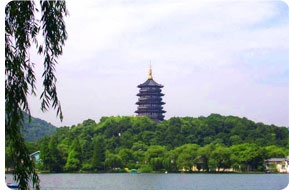 Hangzhou, long famed as 'Heaven on Earth', is typical of the celestially bewitching natural scenery of the region of South of the Yangtze River. As one of the old capital cities of the former dynasties in China, it has also created many unique brilliant cultural sights that the world marvels at. The Italian traveler Marco Polo once praised the city as 'the most beautiful and magnificent city across the world' after he saw it. Ever Since then, Hangzhou has won continuous admiration from home and abroad.
Hangzhou, long famed as 'Heaven on Earth', is typical of the celestially bewitching natural scenery of the region of South of the Yangtze River. As one of the old capital cities of the former dynasties in China, it has also created many unique brilliant cultural sights that the world marvels at. The Italian traveler Marco Polo once praised the city as 'the most beautiful and magnificent city across the world' after he saw it. Ever Since then, Hangzhou has won continuous admiration from home and abroad.
The enchanting West Lake, also called 'Xizi Lake' (Xizi is recognized as the most beautiful lady in the ancient China), boasts the surrounding mysterious cloud-shrouded hills and the picturesque river scenery. 'There are 36 west lakes in the world while the best is in Hangzhou', goes the chant of a former poet who had traveled here. The unparalleled beauty of the lake is beyond words - you must see for yourself. The magic of the lake is further enhanced by the surrounding pavilions, pagodas, temples, mausoleums. Lingyin Temple that has unceasing burning of incenses; the fantastic Feilai Peak, the protruding Solitary Hill, the drinkable Hupao Spring, the majestic and overlooking Six Harmonies Pagoda and the historical Mausoleum of General Yue Fei are always the well-trodden areas for visitors.
The enthralling wonders of Hangzhou also include Qiantang River Bore, the grandest and most exciting river tidal stretches you can experience in China. Qian Dao Hu in an amazing setting of a thousand islets, produces the well-known Chinese natural mineral water 'Nongfu Spring'. The Tiantai Mountain Scenic Area not far from the city is home to a Chinese Buddhist sect and also draws many pilgrims and sightseers.
Hangzhou is also reputed as 'The Home of Silk' and 'The Land of Tea'. The well-known green tea in China-Longjing (Dragon Well) Tea is the product of this region. The silk production in Hangzhou has had a long tradition and the soft and delicate products have become a golden world-renowned trademark of this city. From the National Silk Museum and National Tea Museum, it is possible to appreciate varieties of these products and learn deeper of these cultures.
The Hangzhou dining scene is composed of Hangzhou cuisine, western cuisine and cuisines from other parts of China, visitors' dining requirements can be fulfilled with thousands of available restaurants.
Brief introduction on Hangzhou city
Hangzhou, the capital of Zhejiang province in east China, lies close to the mouth of the Qiantang River at the western end of the Gulf of Hangzhou.
Hangzhou was a small fishing village until late in the sixth century, when the extension of the Grand Canal southward from the Yangzi led to the development of a busy commercial center in the town. It prospered, especially during the peaceful early period of the Tang Dynasty. Its growth was assisted by the development of the lower Yangzi area into the nation's most important agricultural region.
Hangzhou underwent dramatic development when the Song Dynasty, pushed south by the conquering Jin, established its capital there. In a short space of 100 years, the population grew to almost a million and the town flourished as a major trading center. Although the city was partly destroyed by the invading Mongols in the late 13th-century, it appeared impressive to Marco Polo when the famous Italian traveler visited the city shortly afterwards. According to Marco Polo, Hangzhou was “without doubt the finest and most splendid city in the world... there are said to be 13,000 bridges, mostly of stone... vast are the numbers of those accustomed to dainty living, to the point of eating fish and meat at one meal."
As for the West Lake, Marco Pole wrote: “On one side it skirts the city... and commands a distant view of all its grandeur and loveliness, its temples, monasteries, and gardens with their towering trees, running down to the water's edge. On the lake itself is the endless procession of barges thronged with pleasure-seekers... their minds and thoughts are intent upon nothing but bodily pleasures and the delights of society."
Today, the city remains renowned for its beauty, which some claim is unsurpassed in China; and although some of the historic buildings have been destroyed, the archaeological attractions that remain are still impressive. Many sections of the town have not changed for centuries, while the famous West Lake region retains its reputation as one of the most beautiful spots in China, with landscaped gardens on its banks, tree-shaded walks, and in the nearby hills, temples, pagodas, and monasteries.
|



